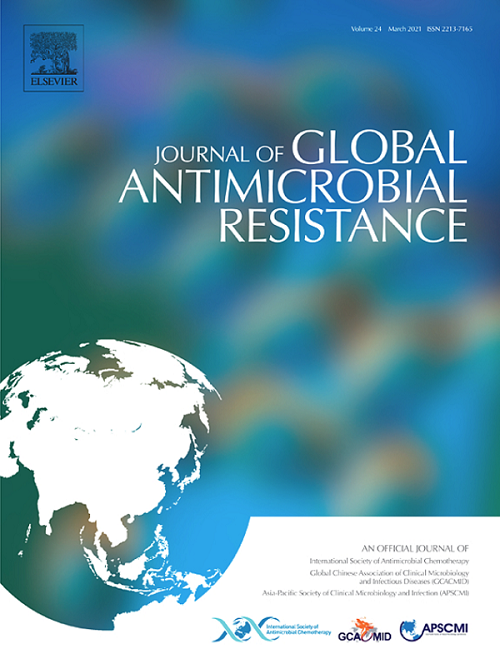在即食蔬菜中产生KPC-2碳青霉烯酶的高毒力B2-ST1193克隆的突现大肠杆菌。
IF 3.7
3区 医学
Q2 INFECTIOUS DISEASES
引用次数: 0
摘要
目标:碳青霉烯耐药病原体是一个全球性的公共卫生问题。大肠杆菌ST1193是一种新兴的高风险克隆,具有长时间的肠道持久性,并与社区发病的尿路和血液感染有关。本研究的目的是报告即食蔬菜(RTE)中产生kpc -2的大肠杆菌ST1193的微生物学和基因组数据。方法:RTE蔬菜购自巴西东南部市场。利用MALDI-TOF鉴定了对广谱β -内酰胺类耐药的附生和内生革兰氏阴性菌。WGS采用Illumina NextSeq平台进行。进行了抗菌敏感性、偶联性和耐酸性试验。采用mellonella感染模型评价毒力行为。结果:在RTE芝麻菜中鉴定出产kpc -2的附生大肠杆菌,属大流行ST1193。基因组分析预测了对β-内酰胺类、氟喹诺酮类、有害重金属、杀虫剂、消毒剂和氯消毒剂具有耐药性的临床相关基因。blaKPC-2基因由结合的IncF质粒携带。大肠杆菌KPC-2/ST1193在pH 2.0下的耐药被证实,与gadWX和ibaG pH耐受基因有关,支持胃酸在到达小肠之前的存活,以及宿主定殖的饮食模式的潜力。高毒力系统群B2的广泛病毒组支持了毒力行为,而基于cgsnp的系统基因组学显示了与美国、中国、墨西哥、法国和巴西流行的医疗相关谱系的克隆关系。结论:我们报道了产kpc -2的高毒力B2-ST1193克隆大肠杆菌在RTE蔬菜中的出现,突出了世卫组织重点病原体向人类传播的可能途径。本文章由计算机程序翻译,如有差异,请以英文原文为准。
Emergent Escherichia coli of the highly virulent B2-ST1193 clone producing KPC-2 carbapenemase in ready-to-eat vegetables
Objectives
Critical priority carbapenem-resistant pathogens constitute a worldwide public health problem. Escherichia coli (E. coli) ST1193 is an emerging high-risk clone that demonstrates prolonged gut persistence, and association with community-onset urinary and bloodstream infections. The purpose of this study is to report microbiological and genomic data on the emergence of KPC-2-producing E. coli ST1193 in ready-to-eat (RTE) vegetables.
Methods
RTE vegetables were purchased from markets in southeastern Brazil. Epiphytic and endophytic Gram-negative bacteria displaying resistance to broad-spectrum beta-lactams were identified by matrix-assisted laser desorption ionization-time of flight mass spectrometry. Whole-genome sequence was conducted using the Illumina NextSeq platform. Antimicrobial susceptibility, conjugation, and acid tolerance assays were performed. Virulence behaviour was evaluated using the Galleria mellonella (G. mellonella) infection model.
Results
Epiphytic KPC-2-producing E. coli belonging to pandemic ST1193 was identified in RTE arugula. Genomic analysis predicted clinically relevant genes conferring resistance to β-lactams, fluoroquinolones, hazardous heavy metals, pesticides, disinfectants, and chlorine sanitizer. The blaKPC-2 gene was carried by a conjugative IncF plasmid. Acid tolerance of E. coli KPC-2/ST1193 during exposure to pH 2.0 was confirmed, being associated with gadWX and ibaG pH tolerance genes, supporting survival to stomach acid prior to reaching the small intestine, and potential for a dietary mode of host colonization. Virulent behaviour was supported by wide virulome of the highly virulent phylogroup B2, whereas single nucleotide polymorphisms of core genes (cgSNP)-based phylogenomics revealed clonal relationship with healthcare-associated lineages circulating in the United States, China, Mexico, France, and Brazil.
Conclusions
We report the occurrence of KPC-2-producing E. coli of the highly virulent B2-ST1193 clone in RTE vegetables, highlighting a possible route of dissemination of the World Health Organization (WHO) priority pathogens to humans. © 2024 The Author(s). Published by Elsevier Ltd on behalf of International Society for Antimicrobial Chemotherapy.
求助全文
通过发布文献求助,成功后即可免费获取论文全文。
去求助
来源期刊

Journal of global antimicrobial resistance
INFECTIOUS DISEASES-PHARMACOLOGY & PHARMACY
CiteScore
8.70
自引率
2.20%
发文量
285
审稿时长
34 weeks
期刊介绍:
The Journal of Global Antimicrobial Resistance (JGAR) is a quarterly online journal run by an international Editorial Board that focuses on the global spread of antibiotic-resistant microbes.
JGAR is a dedicated journal for all professionals working in research, health care, the environment and animal infection control, aiming to track the resistance threat worldwide and provides a single voice devoted to antimicrobial resistance (AMR).
Featuring peer-reviewed and up to date research articles, reviews, short notes and hot topics JGAR covers the key topics related to antibacterial, antiviral, antifungal and antiparasitic resistance.
 求助内容:
求助内容: 应助结果提醒方式:
应助结果提醒方式:


